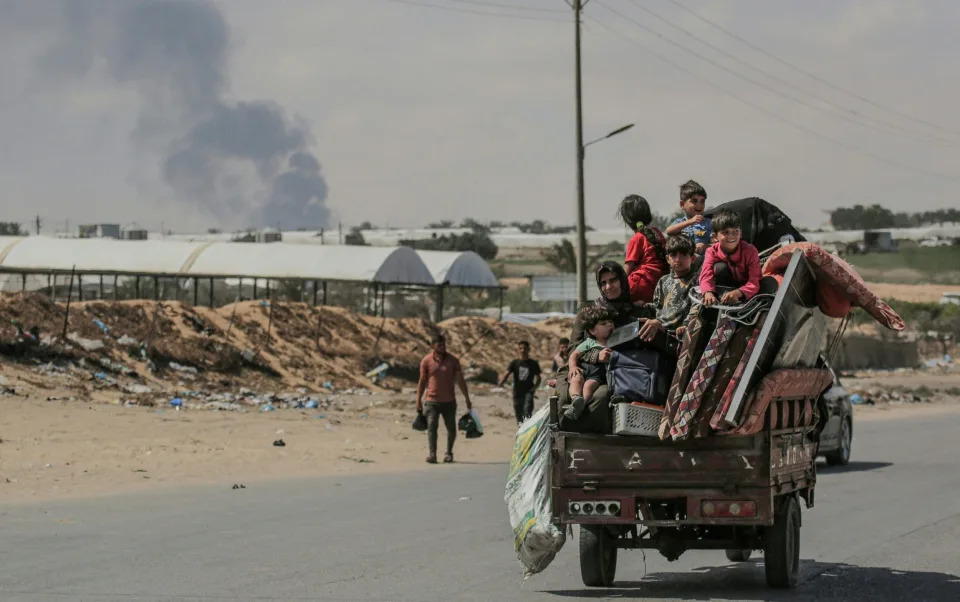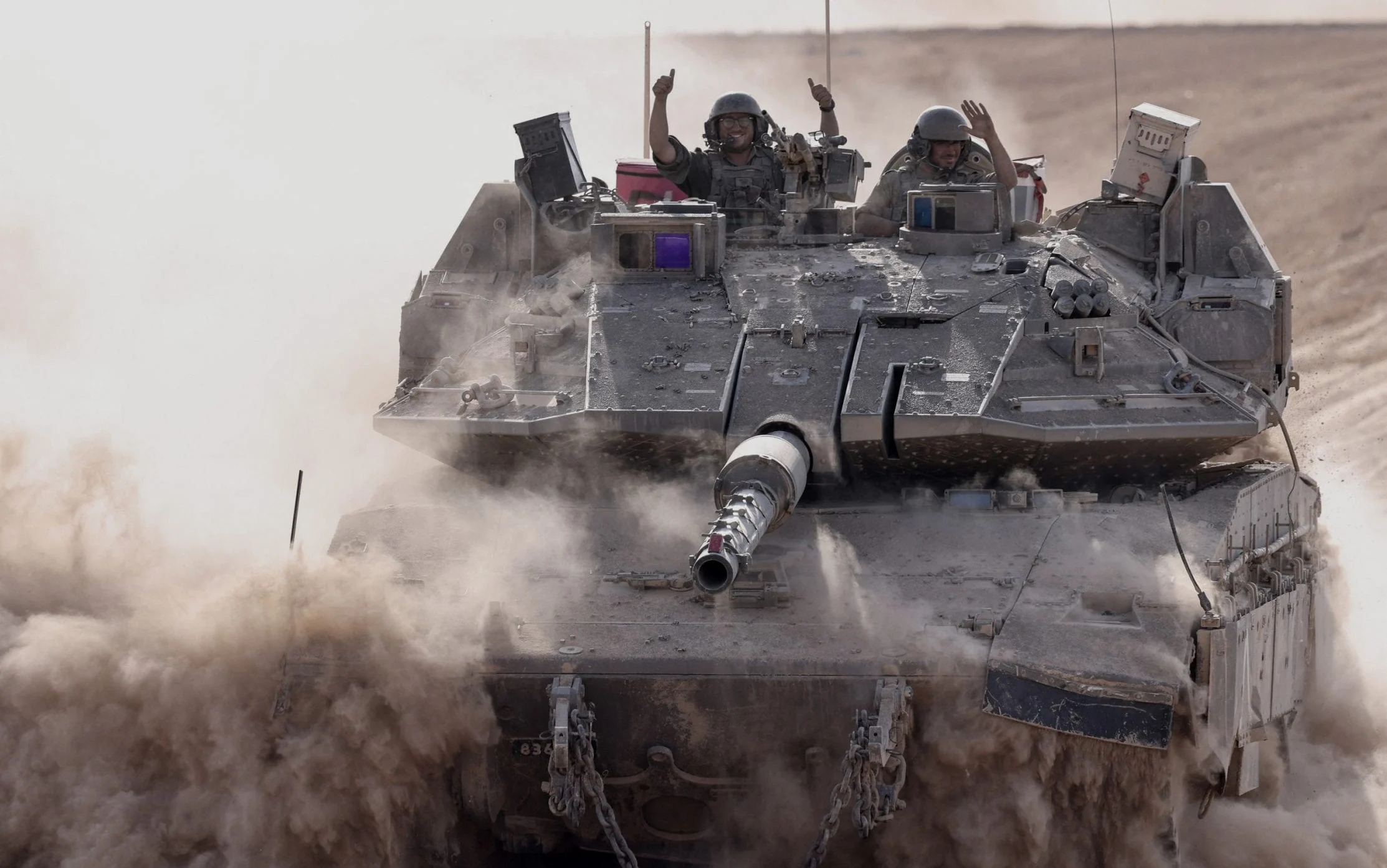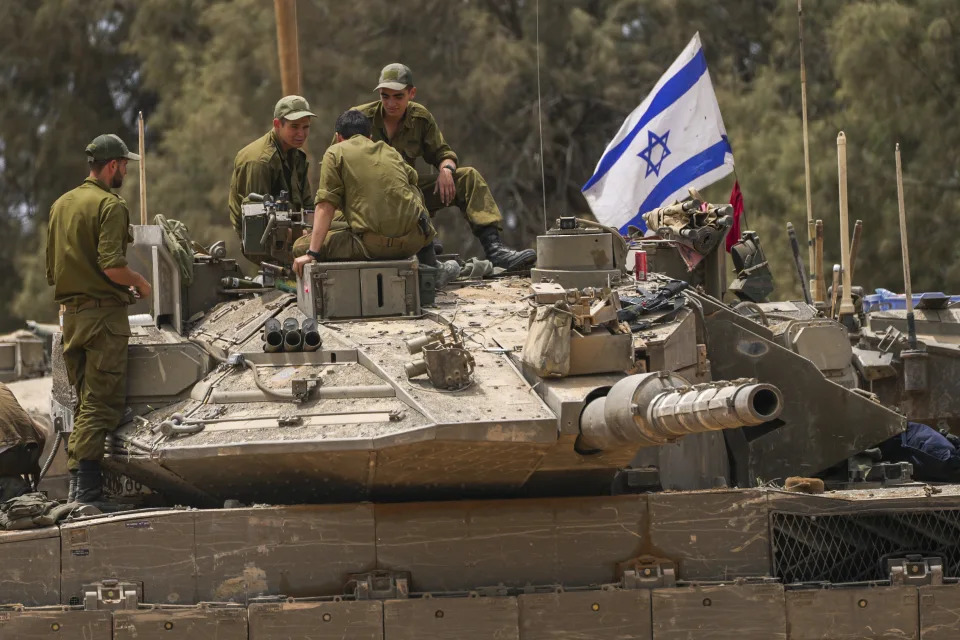Israeli soldiers gesture from a military vehicle in southern Israel near the border with the Gaza Strip -
Egypt has warned it will not hesitate to respond militarily after Israeli forces took control of a buffer zone along its border with the Gaza Strip.
Daniel Hagari, Israel’s chief military spokesperson, said Israeli forces had gained “operational” control over the “Philadelphi Corridor”, using the Israeli military’s code name for the 14 km-long (nine-mile) corridor along the Gaza Strip’s only border with Egypt.
“The Philadelphi Corridor served as an oxygen line for Hamas, which it regularly used to smuggle weapons into the area of the Gaza Strip,” Mr Hagari said. Hamas is the armed Palestinian group that governs the blockaded territory.
Mr Hagari did not spell out what “operational” control referred to but an Israeli military official earlier said there were Israeli “boots on the ground” along parts of the corridor.
The border with Egypt along the southern edge was the Gaza Strip’s only land border that Israel had not controlled directly.

Relations between Israel and its key Arab ally Egypt are now fraying, according to the Wall Street Journal, with Egypt telling Israel it will not hesitate to respond militarily if it feels its security has been threatened.
Israel has claimed there are at least 20 tunnels in the Philadelphi corridor.
A high-level Egyptian source said in response: “Israel is using these allegations to justify continuing the operation on the Palestinian city of Rafah and prolonging the war for political purposes,” according to state-linked Al-Qahera News.
Egypt has denied the existence of the tunnel network linking Egypt’s Sinai and the Hamas-controlled strip.
Just days ago, Egyptian forces posted at the Gaza border opened fire on Israeli forces operating in Rafah in what is believed to have been a revenge attack for the humanitarian crisis unravelling in Gaza. In the resulting exchange of fire, an Egyptian soldier was killed.
The tensions pose a risk to Israel’s efforts to free its 125 remaining hostages held by Hamas, with Egypt a key mediator between Israel and Hamas along with Qatar and the US.
Both Israel and Egypt remain ideologically united on the goal of eliminating Hamas and the Muslim Brotherhood but, amid global allegations that Israel is committing a genocide in Gaza with 36,000 Palestinians reportedly killed since October 7, it is becoming harder for Egypt to side with its neighbouring country.
Israel has continued to move deeper into Rafah, in spite of an order from the International Court of Justice (ICJ) to end attacks on the area where half of Gaza’s 2.3 million people had previously taken refuge. The US claimed the operation had not crossed its ‘red lines’.
Mr Hagari said Hamas positioned rocket launchers in the Philadelphi Route to dissuade Israel from striking close to the Egyptian border as the conflict in the southernmost part of the strip continued.
AfriPrime App link: Absolutely risk free and FREE for download...
https://www.amazon.com/Africircle-AfriPrime/dp/B0D2M3F2JT
Rafah offensive
Earlier on Wednesday, Israel sent tanks on raids into Rafah. They had moved into the heart of Rafah for the first time on Tuesday despite an order from the top United Nations court to immediately halt the assault on the city.
The ICJ, the UN World Court, said Israel had not explained how it would keep evacuees from Rafah safe and provide food, water and medicine. Its ruling also called on Hamas to immediately and unconditionally release hostages taken from Israel on Oct. 7.
Rafah residents said Israeli tanks had pushed into Tel al-Sultan in the west and Yibna, and near Shaboura in the centre, before retreating towards a buffer zone on the border with Egypt, rather than staying put as they have in other offensives.
“We received distress calls from residents in Tel al-Sultan where drones targeted displaced citizens as they moved from areas where they were staying toward the safe areas,” said Haitham al Hams, the deputy director of ambulance and emergency services in Rafah.
Palestinian health officials said 19 civilians had been killed in Israeli airstrikes and shelling across Gaza. Israel accuses Hamas militants of hiding among civilians, something Gaza’s ruling Islamist group denies.
Majed Abu Raman, the health minister, urged Washington to pressure Israel to open the Rafah crossing to aid, saying there was no indication that Israeli authorities would do so soon and that patients in besieged Gaza were dying for lack of treatment.
Fighting in Gaza will continue throughout 2024 at least, said Tzachi Hanegbi, Israel’s national security adviser, signalling Israel was not ready to end the war as Hamas has demanded as part of a deal to exchange its hostages for Palestinian prisoners.
“The fighting in Rafah is not a pointless war,” Mr Hanegbi said, reiterating that Israel aimed to end Hamas rule in Gaza and stop it and its allies attacking Israel.
Antony Blinken, US secretary of state, said Israel needed to craft a post-war plan for Gaza or risk lawlessness, chaos and a Hamas comeback in the enclave.
The US, Israel’s closest ally, reiterated its opposition to a major ground offensive in Rafah on Tuesday while saying it did not believe such an operation was under way.
More than 36,000 Palestinians have been killed in Israel’s Gaza offensive, the enclave’s health ministry said.
Israel launched its war after Hamas-led militants attacked southern Israeli communities on Oct 7, killing around 1,200 people and seizing more than 250 hostages, according to Israeli tallies.
Hostage release talks
There was no word on Wednesday on developments in the ceasefire and hostage release talks. Hamas has said talks are pointless unless Israel ends its offensive on Rafah.
The armed wing of Hamas, and that of allies Islamic Jihad, said they confronted invading forces in Rafah with anti-tank rockets and mortar bombs. They said they blew up explosive devices that had been planted, resulting in numerous successful hits.
The Israeli military said three Israeli soldiers were killed and three badly wounded. Public broadcaster Kan radio said an explosive device had been set off in a Rafah building.
Palestinian health officials said several people were wounded by Israeli fire. They said stores of aid were set ablaze in eastern Rafah, where residents said Israeli bombardment had destroyed many homes in an area Israel has ordered to be evacuated.
Around a million Palestinians who had taken shelter in Rafah at the southern end of the Gaza Strip have now fled after Israeli orders to evacuate, UNRWA, the UN agency for Palestinian refugees reported on Tuesday.
The Palestine Red Crescent Society (PRCS) said it had evacuated its medical teams from its field hospital in the Al-Mawasi area, a designated civilian evacuation zone, because of continued bombardments.
PRCS said two of its staff were killed when an ambulance was struck while on a mission to rescue people in Rafah. In another Israeli air strike on a house in Gaza City, medics said five other Palestinians were killed.
In the nearby city of Khan Younis, an Israeli air strike killed three people overnight, including Salama Baraka, a former senior Hamas police officer, medics and Hamas media said. Another killed four people, including two children, medics reported.
In northern Gaza, Israeli forces shelled Gaza City neighbourhoods and moved deeper into Jabalia, where residents said large residential districts were destroyed.
Malnutrition has become widespread in Gaza as aid deliveries have slowed to a trickle. The UN, which has warned of famine, said on Wednesday the amount of humanitarian aid entering the enclave has dropped by two-thirds since Israel began its assault on the Rafah region this month.
AfriPrime App link: Absolutely risk free and FREE for download...
https://www.amazon.com/Africircle-AfriPrime/dp/B0D2M3F2JT
Israel says it's taken control of key area of Gaza's border with Egypt awash in smuggling tunnels
Israel’s military said Wednesday it seized control of a strategic corridor along Gaza’s border with Egypt to cut off smuggling tunnels as it tries to destroy the militant Hamas group in a war now in its eighth month.
The capture of the Philadelphi Corridor could complicate Israel’s relations with Egypt, which has complained about Israel’s advance toward its border. Israel says the corridor is awash in tunnels that have funneled weapons and other goods for Hamas — despite a yearslong blockade imposed by Israel and Egypt.
Israel also deepened its incursion into the southern Gaza city of Rafah, where hundreds of thousands have been seeking shelter from fighting, and where intensifying violence in recent days has killed dozens of Palestinians. The military said that a fifth brigade — up to several thousand soldiers — joined troops operating in the city on Tuesday.
Egypt says any increase in troops in the strategic border area would violate the countries’ 1979 peace accord. It already has complained about Israel taking over the Rafah border crossing, the only crossing between Gaza and Egypt.
“The Philadelphi Corridor served as the oxygen line of Hamas through which Hamas carried out weapons smuggling into Gaza on a regular basis,” said Israel's military chief spokesperson, Rear Adm. Daniel Hagari.
An Israeli military official said Israel had notified Egypt of the takeover. Some 20 tunnels, including some previously unknown to Israel, were found, as well as 82 access points to the tunnels, said the official, speaking on condition of anonymity in line with military regulations. It was not clear if the tunnels were currently in use.
The corridor is part of a larger demilitarized zone along the entire Israel-Egypt border. Under the peace accord, each side is allowed to deploy only a small number of troops or border guards in the zone, though those numbers can be modified by mutual agreement. At the time of the accord, Israeli troops controlled Gaza, until Israel withdrew its forces and settlers in 2005.
Egypt's state-run Al-Qahera News TV reported there were “no communications with the Israeli side” on the allegations of finding tunnels on the border. Egypt has repeatedly expressed concerns that the Israeli offensive could push Palestinians across the border — a scenario Egypt says is unacceptable.
The narrow corridor — about 100 meters (yards) wide in parts — runs the 14-kilometer (8.6-mile) length of the Gaza side of the border with Egypt and includes the Rafah crossing into Egypt.
AfriPrime App link: Absolutely risk free and FREE for download...
https://www.amazon.com/Africircle-AfriPrime/dp/B0D2M3F2JT
Hamas has had free rein of the border since its 2007 takeover of Gaza.
Smuggling tunnels were dug under the Gaza-Egypt border to get around the Israeli-Egyptian blockade, imposed after Hamas took over. Some of the tunnels were large enough for vehicles. Hamas brought in weapons and supplies, and Gaza residents smuggled in commercial goods, from livestock to construction materials.
That changed over the past decade, as Egypt battled Islamic militants in Sinai. The Egyptian military cracked down on the tunnels and destroyed hundreds of them.
The Israeli military official said Israel has also taken “tactical control” of Tel al-Sultan, a neighborhood on Rafah's northwest edge. But he said the incursion into the city remains a “limited scope and scale operation.”
White House national security spokesman John Kirby said seizure of the Philadelphi Corridor would be consistent with the “limited” ground operation Israeli officials briefed President Joe Biden’s team on for the city of Rafah.
“When they briefed us on their plans for Rafah it did include moving along that corridor and out of the city proper to put pressure on Hamas in the city,” Kirby told reporters Wednesday.
Meanwhile, deadly violence continued. The Gaza Health Ministry said an apparent Israeli strike killed two ambulance crew members on their way to evacuate casualties in Tel al-Sultan.
Earlier Wednesday, a top Israeli official said the war was likely to last through the end of the year — a grim prediction for a conflict that has killed tens of thousands, deepened Israel’s global isolation and brought the region to the brink of a wider conflagration.
Israel's national security adviser, Tzachi Hanegbi, told Kan public radio he was “expecting another seven months of fighting” to destroy the military and governing capabilities of Hamas and the smaller Islamic Jihad militant group.
The army has said from the start the “war will be long,” he said. “They have designated 2024 as a year of war.”
Hanegbi’s remarks raise questions about the future of Gaza and what role Israel will play in it. The United States, Israel's top ally, has demanded that Prime Minister Benjamin Netanyahu decide on a postwar vision for the Palestinian territory. Netanyahu's defense minister and a top governing partner have warned he must take steps to ensure that Israel isn’t bogged down in Gaza indefinitely.
The war has already devastated Gaza’s urban landscape, displaced most of its population and sparked a humanitarian catastrophe and widespread hunger. It has opened Israel up to international legal scrutiny, with world courts faulting it over its wartime conduct, sparked disagreements with the White House, and on Tuesday prompted three European nations to formally recognize a Palestinian state.
Israel says it must dismantle Hamas' last remaining battalions in Rafah and will seek indefinite security control over the Gaza Strip, even after the war ends. Still, it has yet to achieve its main goals of dismantling Hamas and returning scores of hostages captured in Hamas' Oct. 7 attack that triggered the war.
Beyond Rafah, Israeli forces were still battling militants in parts of Gaza the military said it wrested control of months ago — potential signs of a low-level insurgency that could keep Israeli troops engaged in the territory.
The fighting in Rafah has displaced 1 million people, the United Nations says, most of whom were already displaced from other parts of Gaza.
Residents said fighting was underway in the city center and on the outskirts of Tel al-Sultan, the same neighborhood where an Israeli strike over the weekend ignited a fire that swept through an encampment for displaced people, killing dozens. Israel said it was investigating and the blaze may have been caused by a secondary explosion.
A floating pier built by the U.S. to surge aid into the territory was damaged in bad weather, another setback to efforts to bring food to starving Palestinians. Gaza's land crossings are now entirely controlled by Israel.
The U.S. and other allies have warned against a full-fledged offensive in Rafah, with the Biden administration saying this would cross a “red line” and refusing to provide offensive arms for such an undertaking. But so far, it hasn't tried to stop Israel's advances.
Last week, the International Court of Justice ordered Israel to halt its Rafah offensive as part of South Africa’s case accusing Israel of committing genocide against the Palestinians in Gaza, a charge Israel denies.
The war began when militants burst into southern Israel on Oct. 7, killing some 1,200 people, most of them civilians, and taking around 250 hostages. More than 100 were released during a November cease-fire in exchange for Palestinians imprisoned by Israel.
Israel’s offensive in response to the attack has killed at least 36,096 Palestinians, according to Gaza’s Health Ministry, which does not distinguish between fighters and civilians. Israel says it has killed 15,000 militants.
AfriPrime App link: Absolutely risk free and FREE for download...




